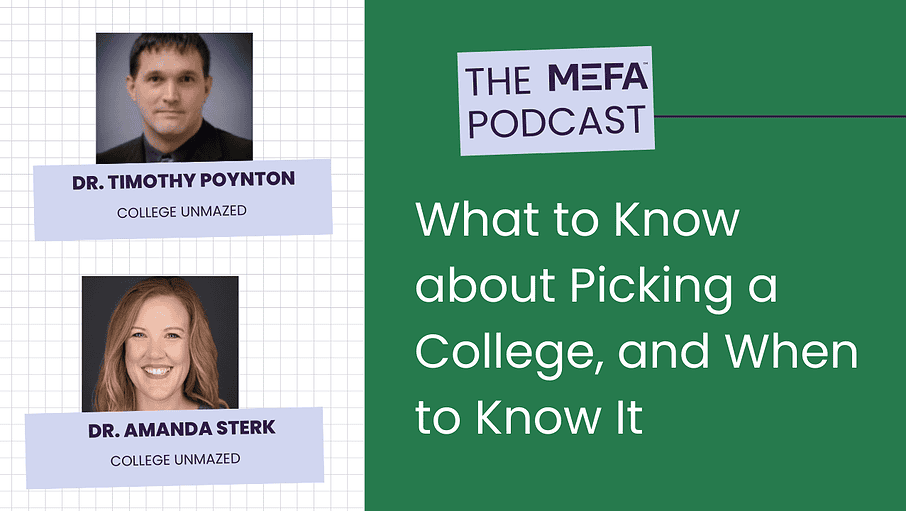

Resources Mentioned in this Episode
Timothy Poynton: [00:00:00] Making the decisions with fact based information or without very much college knowledge, they do then rely on feelings. So I want to be clear that an informed decision actually involves both facts and feelings, right? But for a lot of students and families going through the process, the amount of information is overwhelming, so then they just fall back on the feelings and rely on the feelings.
I don’t know how many people I’ve heard intentioned, say things like, “Oh, when you get on the right, when you get to the college, you’re going to know the right one.” When you’re going to feel it when you’re there, right? Which is well intentioned, but misguided in my opinion, because we can do better than that.
Jonathan Hughes: Hey folks, welcome to the MEFA Podcast. My name is Jonathan Hughes, and you just heard from one of our guests on the show today, Dr. Tim Poynton. And if he sounds familiar to you, it may be [00:01:00] because he and our other guest on the show today, Dr. Amanda Sterk, were featured on a previous episode of the MEFA Podcast.
They represent their organization, College Unmazed, and on our previous show, you heard snippets of a webinar that they did on the six keys to finding a good college fit. Today we’re going to talk about some related topics with them, ones that they address through their College Unmazed curriculum, like having good facts in the college search, and how to integrate that with emotions for students and parents.
And how we can measure students grasp of college knowledge. How we can close gaps between groups of students as to who has that knowledge and who needs it. As well as, finally, what it’s like to do this whole college search and admissions process, not just as academics studying it, but as parents.
So it was a great conversation, and we’ll post [00:02:00] links to the resources in the show notes that they bring up. And if you have a child in high school, or if you are a high school student thinking about college, or even if you’re a counselor, I think you’ll get a lot out of it. So check it out. I’ll be back later on with the wrap up, but for now, let’s get to know our guests from College Unmazed.
Amanda Sterk: Great, yeah. Thank you so much. And so my name is Dr. Amanda Sterk, and I am the Director of College and Career Advising at Method Learning, which is a big national nonprofit. Test prep college advising program here. And I used to work in K 12 as a teacher and school counselor. And then I worked in higher education running a very large dual enrollment program down here in Southwest Florida.
And so really excited to be here and just to share everything we’ve been doing.
Jonathan Hughes: And Tim, how about yourself?
Timothy Poynton: Hi. Yeah, hi, Tim Poynton. I am a associate professor at the University of Massachusetts Boston in the Department of Counseling [00:03:00] and School Psychology. My focus is on teaching the college counseling and the career counseling courses to future school counselors.
Yeah, I also worked as a school counselor in New York State, worked as a college advisor for a little while academic advising, I should say, just to specify that for a minute anyway at the State University of New York at Albany, and yeah, then transitioned into teaching about school counseling instead of practicing it.
Jonathan Hughes: Sort of what brought you to together, essentially, and to College Unmazed.
Timothy Poynton: Yeah, so I guess part of being a professor at most universities, but at the University of Massachusetts, Boston, in particular, is doing research. It’s a big part of my job. It’s a big part of what I like about the job. Probably about 10, 12 years ago, I started working with my colleague Rich LaPan, who’s out at the University of Massachusetts Amherst, and we started doing research to, to try and understand how school counselors support the transition from high school to [00:04:00] college in particular.
So we started doing some research on that. I’ll try to give you the short version long story short one of the things that, that I ended up developing was what’s called the College of Michigan’s Knowledge Evaluation. One of the things that we learned from our research was that it seemed like, Students and families were making decisions about where to go to college with relatively little fact based information, relatively little knowledge, and it seems like people in K 12 education, high schools, and high school counselors in particular, are well positioned to improve that for students.
The first thing to do was to figure out how much college knowledge As we like to call it. And other people call it that as well. But how much college knowledge people actually have. And I learned after looking into it, I was surprised to find that nobody had developed a way to measure college knowledge.
So that was I developed a measure of college knowledge called the cake college admissions knowledge evaluation. And put that out there and it was pretty well received part of me thinks it’s relatively simple and straightforward, but [00:05:00] again, to give you the short version the research showed that basically most students and families are scoring about a 50 on that.
So graduating high school students who had already received all the college knowledge they’re going to get in high school scored about a 50 on that assessment.
Jonathan Hughes: Out of 100? Out of 100?
Timothy Poynton: Fifty out of a hundred.
Jonathan Hughes: Yeah.
Timothy Poynton: Out of a hundred. So that’s a failing grade everywhere I’ve ever been. Yeah so Rich and I started thinking about how we could address that and we were working on a book and that’s when, fortuitously Amanda, who we didn’t know, reached out.
Amanda Sterk: Yeah, so again, I had, being in a school counselor role, I was in a big role and realized, similar to Rich and Tim, it came at it from a different conclusion, boots on the ground, that parents were really just coming in as, Me being the college counselor, they just had so many questions and so much information.
And when you’re, I was one person to about 425 students running this program and trying just to manage students and parents and get them the right information. So I started personally from [00:06:00] my own students writing and blogging and I realized it was a curriculum. And so I put it together for my Florida high school students and realized it was Other families should have this book.
And so I was having some success. I published it and it was having success and people kept saying, what about the national version? I want a book for, Massachusetts and I want a book for Georgia. And but I knew that if we were to go to schools or trio programs and things like that, we needed the research behind the book.
the thinking, right? I knew why I was doing it and I had a master’s in counseling at the time and I was working on my doctorate in educational leadership. And so I actually happened to run across the cake and reached out to Tim and Rich and said, Hey I want to know more about this. I want to use it.
And they said we’re writing a book. And I said I’m writing a book. And so we combined four books. And then that’s where we got College Unmazed and really just reworked it from the [00:07:00] ground up and really thinking about the student path all the way from 9th to 12th grade. And then where do we embed that college knowledge?
So if we know we want to get them to 100, not. All the information needs to happen in 9th grade, but it can’t all happen in 12th grade either. So we were really systematic to scaffold the curriculum so it’s the right time, the right information that can lead families through that process in a more informed way.
So we I think we launched the book, About two years ago now and have had some great success and have some partners. And we’ve expanded all the way into a school based curriculum or a program based curriculum where people can teach it. We have a parent guide. We have a book on dual enrollment.
We have a book on homeschool coming. So we’ve really looked at all different sectors to figure out how. different groups can be informed along the way. So really exciting stuff. [00:08:00]
Jonathan Hughes: Yeah, there’s a lot. I was going over the website, but I mentioned that we had highlighted a presentation that you did for us in an earlier episode of the podcast.
And people should go ahead and listen to that. I think it’s episode 75 or 76 or something, but it’s the six keys to college or finding the right college fit. And thought that was Not it, but a large part of what you, but then looking through everything that you did, I was really overwhelmed by everything that you are able to put out.
I want to go back a little bit to the cake as you call it college. What is it, college?
Timothy Poynton: College admissions knowledge evaluation.
Jonathan Hughes: Did you find that there were certain things that most people knew and certain things that most people didn’t know? The average score was 50, but did they line up with what they knew and what they didn’t know?
Timothy Poynton: Yes generally speaking geez I don’t have the details, but generally speaking people were more so there was two subscales on the measure. One’s knowledge of [00:09:00] college life and the other one was admissions procedures and financial aid and People were generally a little bit better on the knowledge of college life questions which is questions like what’s a syllabus, for example.
And less, less, overall less accurate in some of the specifics around the admissions procedures and financial aid. One of the big ones that was surprising to me, maybe I’m not sure why, but a lot of people didn’t know that like May 1st is National College Decision Day. But there were some questions that they knew more of and some questions they knew less of, so just to be clear on this the article I wrote in the Professional School Counseling journal there were 76 items originally, we whittled that down to 75.
42 of the 76 items were psychometrically valid, so we did, that’s what the research study showed. And so of those 42 items, getting to your point, there were 42 items that weren’t too easy or too hard. Essentially I still recommend for people really to use the full 75 items if they’re going to use it, just because the fact that so [00:10:00] statistically or psychometrically, an item doesn’t perform well, too few people get it wrong.
But in terms of college knowledge those are the ones we want to focus the most on, even though they’re statistically supported. Yeah, there were many more questions that far too few. People knew as opposed to ones that were too easy. We didn’t have, there was only a handful, a small handful of items that most people actually knew.
Amanda Sterk: One of the things we’re trying to do with a College Unmazed or with our type of curriculum is to decrease the gaps of college knowledge, right? As we want students to have that college knowledge because those are the barriers that they’re going to come up against when they’re looking at a two year, four year institutions, right?
Is they need to know what a syllabus is and about the FAFSA and these deadlines and things like that. But in their research, they actually found the gap, and you can be a little clearer on this, Tim, the gap of knowledge actually increases between low income minority students and families that had college going parents.
As school [00:11:00] counselors, we assume that we’re closing the gap and in your research, it shows that the gap does increase from 9th grade to 12th grade. It gets wider for those two groups of students. So that’s one of the things when we really were trying to build college on maze is how can we close that gap for all students?
And again, why that scaffolded approaches is really important.
Jonathan Hughes: Tell me about how you go about trying to close these gaps and promote that knowledge. What are the different ways in which you do that?
Timothy Poynton: Yeah, I think it’s trying to provide school counselors and students and families themselves directly. But our focus really is on supporting school counselors and people who work with students in schools, not just school counselors, but the many fine TRIO programs, for example, the Upward Bound, Figure Ups and things like that. Trying to provide Both curriculum and the book, a student focused workbook to, to provide a scope and sequence as Amanda was talking about with the scaffolding, a scope and sequence [00:12:00] for addressing the college knowledge issues that we know exist.
And just to go back for 1 second to what Amanda was a mention was mentioning so the 2nd part of the study also published in the professional school counseling journal a couple of years later. We did find that the knowledge gap does increase over time. The difference in knowledge between first generation and continuing generation students increases over time, and that’s a real big problem because schools are supposed to be a place for equity, and it’s not happening in the realm of College knowledge.
That’s a problem. That’s a serious problem. So in College Unmazed, to bring it back to your question what we’re trying to do is provide, make the resources available to everybody with a long term goal being of closing that gap. So that students, first generation students, those who are the first in their families to go to college aren’t disadvantaged because that’s what it amounts to. The knowledge gap leads to a disadvantaged in the college search and application process.
Jonathan Hughes: One of the things that I really liked about your presentation that we highlighted was [00:13:00] that you had not just Identified all the factors that you need to know about when you’re compiling your college list, etc. But what steps you might need to implement those things?
So it might not be helpful for example to look at costs right at the very beginning right or to have that determined So Can you tell me a little bit about that? What should students be thinking about their freshman year versus their sophomore year, junior year, senior year, et cetera.
Amanda Sterk: Yeah. And I’ll take this one. So you- so we have really two sections of the book because we really believe that it’s. It comes in one is the actual process of applying and thinking about your college list, which is really your junior, senior year. And then your freshman, sophomore is really building those critical skills that you need to be college and career ready, right?
So we talk about them as the eight strengths of college and career readiness. The things about agency and being able to manage your time and having that college knowledge. One of the big things we talk a lot about is. [00:14:00] building a college support network around you. So really the first half of the workbook, we really dive into, what we call building your you factor, what’s unique about you, your passions, your interests.
We talk about academically, like how do you build your academic factor in terms of your classes your, Even career options things like that within your school setting or even outside of your school if you’re going to maybe take a class over the summer or do community college and what does that sort of look as a plan?
We also then focus on your career factor because a lot of students don’t know and they don’t know how to navigate their interests and their values and their abilities and so we want them to have that conversation and then fourth we really want them to start talking about money and scholarships because too many times I think schools leave that until the very end and one of the things that we try to preface with it all is that college can be very affordable and we want that to come and be affordable out [00:15:00] is that there are a lot of options, whether it’s a two plus two system or staying locally or going to schools that provide full financial aid.
Really looking at those options. And so we really want them to build who they are and be cognizant of that steps. But then we also let them know. We let them know why they’re building those steps. This is what college is looking for. This is what career and employers are looking for.
And this is how you can build those. So when you go to apply to college, you’re going to be a more, well rounded type of student. And then in the second half, we call it leads, is we actually then work them through the process of narrowing down schools, what does that look like, applying for schools, and things like that.
Do you want to add anything to that, Tim?
Timothy Poynton: The only thing I’ll just add on the career factor is lots of people don’t know what they’re doing, what they want to do when they’re in high school, and they don’t know that when they’re in college and when they’re in their 20s or their 30s, their 40s even, right?
Like career development is a lifelong, it’s a [00:16:00] lifelong skill. So we do try to give the cliff notes version, if you will, on that. But what we focus on in the book is less on what major are you interested in and more on what career pathway are you interested in? Like the distinction between being a biomedical engineer and a chemical engineer, for example or a software engineer.
Engineering is all lumped into one career pathway. And so we try to encourage people to think more about the pathways and less about the specific majors. Because that just keeps more doors open than closed. One of the reasons why we have people focus on the career pathways is because While most people might not be able to name a specific major, they can think of oh, I like working with people, or I don’t like working with people, or I like working with numbers and spreadsheets, or I don’t.
People can, they can narrow down. Instead of saying, I have absolutely no idea what I want to do people can be Very oftentimes much a good bit more specific than that to at least narrow it down to a group of career pathways, for example.
Jonathan Hughes: You mentioned earlier on that there were too few students with access to fact [00:17:00] based research when it comes to college.
So that, of course, made me think of the thing that if you don’t have facts, the thing that you fill that with is feelings. Can you talk a little bit about that and the. Some of the things that you’ve seen in your capacity, both of you the feelings that can contribute to maybe somebody making not such a great decision when it’s not based on facts and what you might want to avoid.
Timothy Poynton: Yes, that’s one of the other things, a lot, when people aren’t making the decisions with, fact based information or without very much college knowledge, they do then rely on feelings. So I want to be clear that an informed decision actually involves both facts and feelings, right? But for a lot of students and families going through the process, the amount of information is overwhelming.
So then they just fall back on the feelings and rely on the feelings. Like I don’t know how many people I’ve heard intentioned say things like, Oh, when you get on the right, when you get to the college, you’re going to know the right one. That’s it. You’re going to feel it when you’re there, right?
Which is well [00:18:00] intentioned, but misguided in my opinion, because we can do better than that. We can look at some of the facts to back up those feelings, essentially, or question some of those feelings. I would never say a student should disregard the facts. a college based purely on facts. It should raise questions.
And likewise, I would never say a student should disregard a college completely based on feelings. Like it needs to be both. So for an, a decision to be an informed decision, it needs to involve both the facts and the feelings. And that’s really what we focus on in the book going through what we call the lead strategy, which is making a list, exploring the colleges on that list applying to the colleges From that initial list that you had deciding which college to attend from those you’ve been accepted to and then developing success plan like that’s what we embed in the lead strategy as a way to really pay attention to both the facts and the feelings like in the beginning of that process at the list process, we’re paying more attention to the facts.
And in the explore phase, we’re paying more attention to the facts and then in the apply and decide phase, where we really begin to bring in some [00:19:00] of the feelings so that they can be considered.
Amanda Sterk: And I’ll, note, and I’ll add to that because I think one it’s hard and both Tim and I have recently been going through this process of our own children going through the college process and.
Figuring out when their feelings coming into play versus the facts coming into play. And so we’re going to have that as parents, but I do think it’s important. Like parents are, right now, because of the marketing of a lot of schools, it’s becomes a lot of feelings, right? Because they want to have that feel and that big school feel.
And I swear it was some of the, a lot of the kids I was working with this year, everybody wanted to apply to UT Austin, like Northeastern said the other day, they had 98 students. thousand applications. So these feelings are getting these huge amount of applications. And when you ask this student, why did you apply to Northeastern?
Great university, but what was your reasoning behind it? Or UT Austin or UF or wherever that may be. And so one of the things that I think is important that we do is Tim has come up with this really great tool called the College Data Organizer. It’s completely free. It’s [00:20:00] this amazing Excel sheet. I use it daily within the students I work with.
And it provides those Facts in a way that sort of connects with what are some of the important things that you need to be paying attention to. So you’re getting through the marketing piece of it. So for example, student outcomes, how many students are actually graduating on time from this college or how many are coming in with or coming out with the degree that I’m interested in and what does that mean for me?
Or what is the average debt that people are coming out with? What’s the average amount of financial aid coming in, all these things. And so if you just focus on the dining hall or, what the dorm looks like and not on the outcome, for example I worked at a community college for many years and we had one of the best nursing programs and it had the highest income.
placement rate of any of our universities, even our four year universities within [00:21:00] the area. So if I was talking to a student who really wanted to be a nurse, it’s actually your local community college has a better outcome if that’s the program that you’re looking for. If you go to our other state university, it’s going to cost twice as much.
And actually they don’t have as strong of a program. And you could be at a disadvantage. But if you want a four year university versus, and those are the things that we have to pay attention to, but we have to be more focused in on getting that data, figuring out how that’s applicable to us as a family, and then embedding in that sort of emotional decision.
Timothy Poynton: Yeah, in a word, it’s prestige. It’s prestige. Like what Amanda described is a great example of prestige, like significantly influencing decision. Like all the facts say this community college is better, but the student doesn’t want to see it. doesn’t see themselves as identifying as a community college student, right?
They want to say, I’m going to this college because it’s more prestigious. And I get to wear that as a badge of honor, so to speak. [00:22:00] And we do this in lots of other parts of our lives, right? With the kind of house we buy and like my brother has a saying, like thinking about cars, he always buys the cheapest car he can because he’s it has four wheels and it goes forwards and backwards.
So what do I care? And then there’s other people for whom it’s a status symbol in some ways, if we can say that, and if we can admit that, and I guess if people can admit that to themselves prestige is often highly related to selectivity, which I think gets a little bit into the human nature of wanting the thing that’s the hardest to have, or the thing we can’t have.
Everybody wants to go to Harvard. Harvard is one of the hardest places in the world to go. Gain admission to and it’s perceived to be somehow better as a result of that. But one of the points that we try to make in the book with things like the college data organizer, as Amanda was just eloquently saying what’s good for you isn’t necessarily what’s good in terms of how hard it is to get into.
Those two things are not 100 percent related to each other. There are, State colleges and universities that have really good outcomes. There was just an article that came out not that long ago about the [00:23:00] public Ivies, right? And University of Florida is one of the ones on the list.
What they looked at was student outcomes. They also had selectivity as part of that, like they had to admit no more than 25 percent of applicants or something like that. But what makes a college good for any particular student? Involves more than just how hard it is to get into, but it doesn’t have the name recognition, for example, and that’s part of it.
Jonathan Hughes: Your answer is runs against something I was thinking of when you were earlier in the conversation, and that is how you interact with parents, right? And you mentioned that. I’m curious to know your experience as parents in this process as well. First of all, how do you What do you see from parents versus students in the answers that you, in the topic of the answer that you just gave?
The prestige and the emotions and things like that. And then also, whether it’s that or whether it’s just the actual process itself, did anything jump out at you [00:24:00] going through the process as parents? Versus in your professional role,
Amanda Sterk: I’ll go first and this disclosure, my daughter’s a junior and I have a freshman daughter and one, one’s nursing. And so again, when she gets a degree, it doesn’t matter where she goes to. That degree, that nursing degree is going to get her any job that she is really looking for. They’re not looking, they’re looking at your communication skills and did you pass the test?
And did you do well? It’s not about a specific name where my other daughter is looking at graduate school. She was looking at a PhD program. And so we’re trying to, as parents tease out what is best for them. Both of them because they’re on different paths and being very communicative throughout that process and part of what I love about both are the first part of the book the four factors that we talk about and the lead strategy is we are having those conversations about as family, how much are we going to [00:25:00] be able to pay and what does that look like?
And we’re going to be looking at merit aid and looking at a school that doesn’t give any merit aid is only financial aid. might not be the best use of our choices. And so part of it is informing the student along the way, whether they’re in middle school, freshmen, junior, senior, and really having them explain why they like a college, so instead of just saying, Oh, I love this college is beautiful. I want them to say, it looks like. The library really has these amazing resources. I has a writing center that I could use if I need accommodations. That’s a big one that I always focus on with families. If your student needs 504 IEP, what are those services once you get to college?
And I would much rather my daughter just as an example, say, you know what? I need a small group setting for my math class instead of being with 300 students and really having that conversation that does that school meet that need or not [00:26:00] to make them or allow them to be successful, right? And I just don’t think enough parents are digging in deep and saying what type of student is, My students and what type of environment is actually going to allow them to flourish and finding something that sort of makes that match.
Part of for me, it’s just that communication piece, right? And you narrow down until you get your list. And then hopefully the list is broad enough that no matter what’s on your list is a really good choice. We don’t want to just I think too many kids are just throwing stuff on and being like maybe it’s, let’s see, I want it to be a real thoughtful choice.
So no matter what comes out to my daughter’s being accepted, every single one is a good choice. And then we can narrow down. And then that’s when we bring in that emotional feeling a little bit, right? Okay. Now that we know we’re accepted and we look at the financial aid package. Now, where do those feelings come into place?
But sometimes those feelings are misguided or misplaced [00:27:00] too early in the process and they get blinded by everything else is telling them this isn’t maybe the best school for you. Tim, do you want to add to that? I know you just finished the process.
Timothy Poynton: Yeah, no, my daughter’s a graduating senior, so going to be attending college next year, and I don’t want to name names but my daughter’s process was interesting in that I think to get to your point in terms of having people own their reasons for making the decisions that they make.
This was one of the struggles that we had. So we, of course, we put together a list and she was accepted to a good range of schools that she narrowed it down to, she ended up liking the tech school vibe essentially. And statistically speaking, she applied to some public, some privates and got into the majority of them.
So when we were making the decisions she was between two tech schools essentially, and one was 40 percent more than the other. So at the start of this process, We set a budget, at the start of the process, is that here’s the amount of money that we as a family can afford. If you can keep it, your decision to, [00:28:00] less than this, like you can graduate debt free.
If it’s more than this, then you’re going to have to shoulder the student loans. I wasn’t responsible. It would end up being about 17, 000 a year in student loans. She liked, but she liked the one tech school better than the other. Of course, she liked the more expensive one better. There were They’re very similar in a lot of ways, they’re different in some other ways, but I was trying to get her to explain her reasoning, and she couldn’t do it she was having trouble basically owning it, which, as you can, that was really hard for me.
So my solution to that was to just provide as many learning opportunities as possible to try and help her learn more about both places. So we went to the admitted student days We did more research online, and what ended up tipping it for, there was an admitted student reception that was after the admitted student day that we did on campus, and it was like a two and a half hour drive, but we decided to go to this admitted student reception anyway, and they showed a video where it finally clicked for her, and it came down to socialization, essentially, she would have felt more comfortable socially in the tech school that had a slightly [00:29:00] higher percentage.
female to male gender ratio than the other one that had a lower gender ratio. But the one with the lower gender ratio, unsurprisingly, was cheaper. But they provided, they showed a video of how they helped the students Make friends and get acquainted with their classmates and the team building activities they do.
And that was what did it for him. We didn’t learn about that anywhere else. We learned about it in that one place. So that was what tipped the scales in her favor and made her say so the first thing she said, I think this is what I liked. And then the second thing she said, it was now I can graduate debt free.
But it was a struggle there for a little while. For me as a parent, because who wants to see their kid, lining up to, to graduate with 70 plus thousand dollars in debt, like making this decision. That’s really hard. I wasn’t going to say I, I was struggling to say no, but I was really close to it.
To say, I can’t let you do that to yourself. And I’m glad I didn’t have to at the end of it but it was hard there for a while. So it can happen to anybody. I think it happens more frequently than perhaps we even know about. And maybe people [00:30:00] just not to throw my wife under the bus, but she was fine with it.
She was like, oh, if she likes it better, that’s where she should go. And I’m like, no, we can do a little bit better than that. Like we need to do a little bit better than that for that amount of money.
Jonathan Hughes: That’s a great and that’s such a great point to own your decision right to know why you want to attend a particular college and whatever that decision is just to know why you’re doing it is so valuable and I appreciate that.
I want to talk about so many more things, but we maybe you’ll come back and talk about. homeschooling and talk about dual enrollment, as I know that those are areas of focus for you that I’m actually really interested in. But is there anything else before we go that you want to leave people with who are hearing this and whether or not they are students or have a student and they want to know more or either about college and may is about what you do, or just some general advice that anything you want to say before we go.
Amanda Sterk: Yeah, I’ll go. I’ll just say, really college inmates really came from both the research side of the house as working with literally thousands of [00:31:00] students and really putting it into practice every day we put into practice and we see what families are needing and missing. And what I like about it, it’s nice, it’s simple, it’s broken down and it really gives parents the tools to help the student all the way through the process.
And obviously, Definitely check out our materials. It’s a nice way that just you feel empowered. Even talking to your school counselor doesn’t replace the school counselor, but it allows for a more fruitful conversation between parents and students in the school and that college support network.
Obviously, we’d love for you to check it out and check out that college data organizer. So that’s on collegeunmazed.com/downloads. And I know at MEFA, you guys have shared that a few times and it’s a great resource just to really provide that facts in comparison to those six keys of college fit.
So yeah, please collegeunmazed.com, really simple. Would love to hear from you guys for sure.
Timothy Poynton: And just to to emphasize, it’s free. The downloads the College Data Organizer is free. [00:32:00] And another free resource that we just launched is we actually updated the College Knowledge Quizzes a little bit.
It’s no longer the cake but we updated them and broke it up into two shorter quizzes. If you go to collegeunmaed.com/quiz there’s quizzes there to just assess what we call your basic college knowledge and then your decision making knowledge. And If you take the quiz, it emails you a score report that you can then share with a counselor or an advisor or whomever.
That’s a free resource that we just recently launched in the past week or so, actually. Give that a shot. It’s free. And yep, love to see students, families, and counselors use the materials.
Jonathan Hughes: Thank you so much for being here. Tim, Amanda, thank you very much. And hopefully you will come back and talk about those other items that are on my list.
Amanda Sterk: Please. Anytime. I’m happy to, for sure.
Jonathan Hughes: Yep. Thank you very much.
All right, folks. That was our show today. [00:33:00] I want to thank our guests, Dr. Timothy Poynton and Dr. Amanda Sterk. It was great having you on and hearing what you had to say. I learned a lot. And folks, if you liked what you heard today and you want to know more from us on planning, saving, and paying for college and career readiness, then please follow our show and you can do that wherever you find your podcasts.
Please remember to review us as well as it does help us to keep doing what we’re doing and getting this show out to folks like you. Oh and if you have anybody in your life, friends, family that may also benefit from hearing the show and the things that we talk about, definitely let them know that we’re around.
I want to thank our producer, Shaun Connolly. I’d like to thank AJ Yee, Lauren Danz, and Lisa Rooney for their assistance in getting the show posted so that you can hear it. And once again, my name is Jonathan Hughes, and this has been the MEFA Podcast. Thank [00:34:00] [00:35:00] you.










